English Words in Action, Group S
(a variety of English words which have developed through history and are currently used in our modern age)
Simply click on this banner (or the following link) and you will be on your way to stimulate your brain for greater word comprehension with quizzes based on some of the words in this unit.
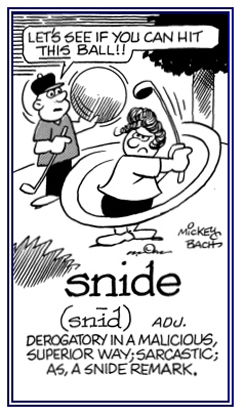
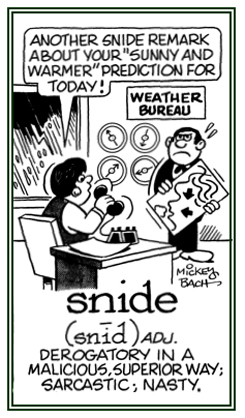
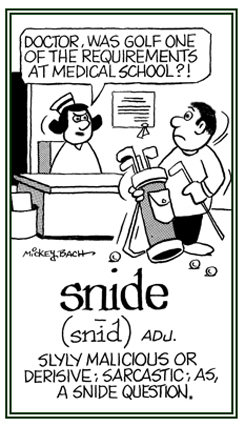
Go to this Word A Day Revisited Index
so you can see more of Mickey Bach's cartoons.
Often in the evening while Glenda watches TV, you can see her catching a few snoozes now and then.
Frank and Cleo thought that the film that they saw last night was about the biggest snoozer they had ever seen.
2. A person who dozes off in places other than in his or her bed: While the lecture was going on, there were obviously a few snoozers in the audience.The hunters were able to find a snug cabin in the woods where they could feel safe and at ease.
2. Tight fitting or skin-tight: Athena told the salesperson that the shoes that were brought to her to try on were too snug and to please bring her a larger size.3. Etymology: from Low German snugger, "compact, trim", as in the phrase a trim ship; that is, a watertight, seaworthy, well-run ship.
The opposite of sobriety is the situation of being drunk or "insobriety".
Sobriety is the condition of not having any measurable levels or effects from alcohol.
Sobriety is particularly being clear of any immediate or residual effects of any mind-altering substances; so, it may refer to a specific substance that is the concern of a particular recovery support program including alcohol, marijuana, opiates, or tobacco.
2. The quality of being grave in treatment, manner, or demeanor: The sobriety, solemnity, and calmness at the funeral of Jane's grandmother was felt by everyone attending.3. A situation that has serious consequences: There was a sobriety of Presley's auto accident that had to be worked out by the police.
4. Etymology: from Latin sobrietatem, from sobrius, "not drunk, temperate, moderate, sensible" also "moderate in desires or actions, restrained"; especially, "abstaining from strong drink," and being "calm, quiet, and not being overcome by emotions."
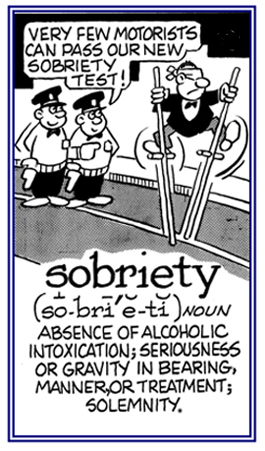
Go to this Word A Day Revisited Index
so you can see more of Mickey Bach's cartoons.
2. Distinct from a pseudonym, it usually is a familiar name used in place of a real one, often becoming more familiar than the original title: "Bill" is a sobriquet which is often used in place of "William".
The influence on human society by dogs has given each one the sobriquet, "man's best friend".
Bollywood is the sobriquet for the film industry based in Mumbai, India.
3. Etymology: from French sobriquet, "nickname"; from Middle French soubriquet, which also meant "a jest, a quip" and is said to have meant literally "a chuck under the chin".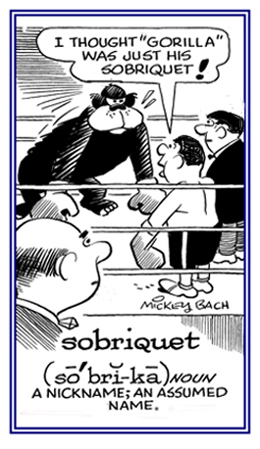
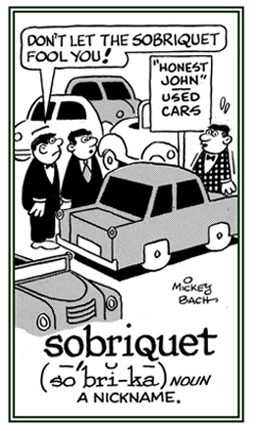
Go to this Word A Day Revisited Index
so you can see more of Mickey Bach's cartoons.
When soldiers go into battle for their countries, they are usually in danger of being seriously wounded or being killed.
2. An active, loyal, or militant follower of an organization: The underlings of a crime syndicate are often referred to as soldiers.3. Etymology: from Old French soudier, "someone who serves in the military for pay", from Medieval Latin (as written and spoken c.700-c.1500) soldarius, "a soldier", literally "someone receiving pay"; from Late Latin soldum, from Latin solidus, "a Roman gold coin" or the name of the gold coin used to pay soldiers who fought in the Roman army; literally, "solid coin".
2. An impolite or improper way of behaving: During dinner, George burped loudly and so his mother reminded him that he was committing an unacceptable solecism.
Etymology: from Greek soloikismos, "a speaking incorrectly", and from Latin soloecismus, "a mistake in speaking or writing."

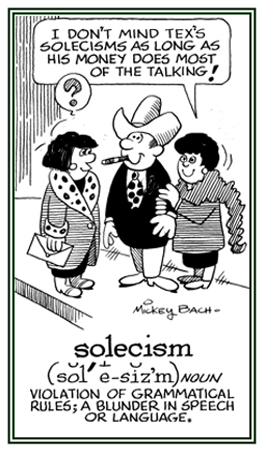
Go to this Word A Day Revisited Index
so you can see more of Mickey Bach's cartoons.
Synonyms of soothsayer include: a prophet, a diviner, an oracle, a fortune-teller.
2. Etymology: from Middle English sothseiere, "one who makes prophecies or predictions" or who speaks sooth, "truth".
Go to this Word A Day Revisited Index
so you can see more of Mickey Bach's cartoons.
"To pass it" in the cartoon could mean "not to reveal it to authorities; such as, in his income tax report."
In the early 1990s, a new definition of spam come into existence which refers to unwanted internet advertising in e-mails sent to a large number of people which are primarily produced for commercial advertising or marketing reasons.
Unfortunately, the lack of unenforceable rules on the internet also makes it a perfect place for spam or fraud to cause anger for many users.
2. Etymology: since 1937, spam has been used to mean "canned meat" which was named because it included a combination of the words spiced and ham.2. To post a message many times to a newsgroup, or an inappropriate message that is sent to multiple newsgroups and individuals on websites: Zelda didn't realize that an offer of sharing money from an unknown person, who was spamming her, was a trick to get her money.
Everyday there is someone who spams with e-mails over and over again and all of us should avoid opening such messages.
Sam and his wife saved money by being sparing shoppers.
2. Etymology: from Latin spargere, "to sprinkle" and the adjective form describes being "moderate, economical".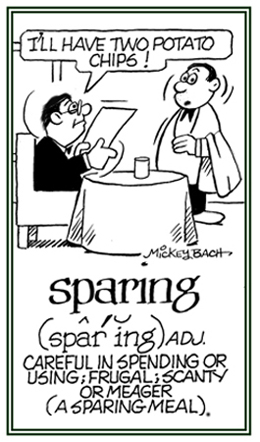
Go to this Word A Day Revisited Index
Links to all of the groups of English words in action, Groups A to Z.
You may see the bibliographic list of sources of information for these words in action.


